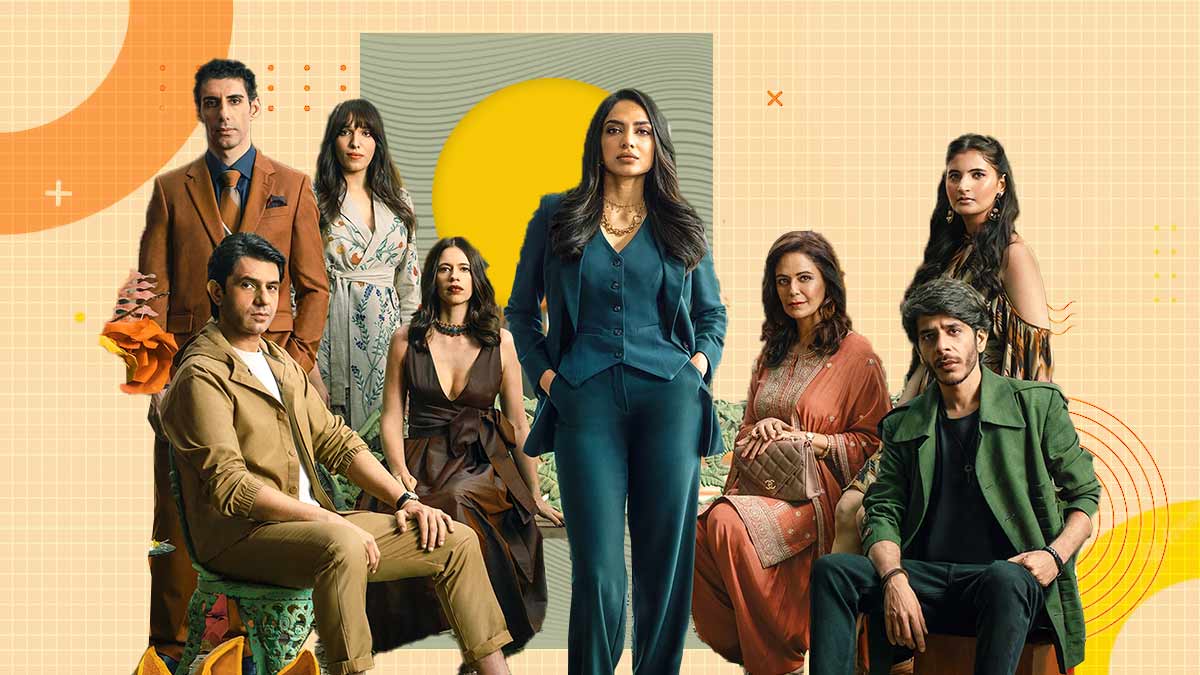In a scene in ‘Made in Heaven’ Season 2, Jim Sarbh’s character Adil Khanna tells his pregnant lover Faiza (played by Kalki Koechlin): “We aren’t living in the 18th century.” To which she replies, “Tell that to my father.” It’s ironic, given how all the show does is give us moral lectures on issues and social constructs from the 18th century. Or is that where we continue to be in many senses? It’s not clear enough if the show seeks to address this question. But its engagement seems simplistic nonetheless.
Centred around the lives of wedding planners, the second season of the show debuted a day earlier than scheduled, on 9th August. It has since been quite the talk of the town. Mona Singh’s introduction as Bulbul steals the show. Shobhita Dhuliapala’s Tara is still the most grey, yet the most striking character. Introducing a trans actor Trinetra as Meher without reducing it to mere tokenism is refreshing.
However, spanning seven episodes, each over one hour, the show uses most, if not all, of its plot points to pontificate about deep-seated prejudices that plague even the rich and fancy of Delhi.
It gets preachy in parts, yes; but, more importantly, are we ever going to move past these same age-old tropes of colourism, caste, age gap, and LGBT acceptance? By harping on the same topics innumerable times, commentary on-screen beyond the obvious seems like a faraway dream. Even if the issues remain similar, the viewer will miss nuance.
Read: Made In Heaven: Recap Of How Things Ended Before Season 2 Takes Off
Fair is Not Always Lovely
The first episode is about a bride being insecure about her skin tone, and getting treatments to lighten her complexion. Firstly, the actress cast for this role barely qualifies as ‘dark-skinned’. What also feels inorganic (and a tad bit boring) are others in the show spewing statistics about how many fairness creams are sold in India, or her fiance calling her skin tone “sexy”, which plays to a whole other stereotype altogether.
Moving beyond this, what is clearly noticeable is skin tone still being a topic we need to discuss in the 21st century.
It isn’t surprising, though. Because, if you turn to matrimonial ads even on fancy apps which try to be a shade more woke, “fair, beautiful” girls are always preferred. This is even true for the woke-est of circles, like high-profile clients on the show ‘Indian Matchmaking’, on Netflix. Richa, in Season 1 of that show, says she wants a soulmate who is “not too dark; you know, fair-skinned” and an astrologer assures a client that he’ll get a girl “as fair as the moon”.
Where the reel meets the real, even Arpita Singh, Salman Khan’s sister, is routinely trolled for being darker-skinned. Trolls go to the extent of pitying her husband. Several actresses like Priyanka Chopra have spoken about their skin tones artificially being made lighter.
While all of this makes a case for a whole episode being dedicated to skin tone in a show like ‘Made in Heaven’, which is essentially social commentary, it also makes one wonder if we’re ever going to move past these obvious arguments.
LGBTQ Couples Fighting for Acceptance
Be it ‘Modern Love: India’, or ‘Made in Heaven’, the arc of a gay or lesbian person is rooted in fighting for acceptance. The main character’s biggest problem in life continues to be finding love from their families, inclusive of their sexual identity. This is true for Arjun Mathur’s Karan in ‘Made in Heaven’ or Radhika’s story in the latest season.
In ‘Kapoor and Sons’, Ratna Pathak’s character is horrified to see photos of her son and his boyfriend. Hailed as path-breaking, in ‘Ek Ladki Ko Dekha Toh Aisa Laga’, Sonam Kapoor’s lesbian character strives to earn her father’s acceptance.
Dealing with homophobia is the most highlighted aspect of all depictions of LGBTQ love, whether it's within the family or society at large. A depiction of a same-sex couple, in an Indian context, dealing with relationship issues beyond this seems far-fetched for now.
Shows in the West have shown narratives around such love stories, which may have been easier to make considering an overarchingly more progressive society. Think David and Patrick from ‘Schitt’s Creek’, who deal with the usual issues couples deal with, or Chase and Jo from ‘Easy’, a lesbian couple trying to navigate vast lifestyle differences.
Yes, acceptance is an issue. But is there anything beyond that in these relationships – such as jealousy or cheating or a fight over politics, or just a tiff over which TV show to watch? Before they are any gender or any stereotype, people are people first; no?
Caste Issues
Radhika Apte’s episode in ‘Made in Heaven’ S2 is perhaps the most thoughtfully crafted, showing a wedding we’ve not quite seen on this scale on the big screen. While the class lens may be missing, her inner dilemma as a proud Dalit woman trying to be friendly with in-laws while holding her grounds and politics is portrayed with nuance.
Caste is so deep-rooted in India that this depiction comes as a lovely surprise. It’s directed by Neeraj Ghaywan, who has previously directed ‘Geeli Pucchi’, a part of the anthology ‘Ajeeb Daastaans’, which dealt with the intersection of caste and queer love. He is also the man who made ‘Masaan’!
However, it still points to the continued obsession in our society with caste. No matter how many shows are made, books written or lectures delivered, the fact that even the most educated of the lot stick to age-old regressive prejudices is an indicator of how very little progress has been made on this front. Matrimonial ads and sites have dedicated sections to caste, gotra and gon, and even the option to filter out everyone below one’s caste.
Partners Cheat Only in Unhappy or Abusive Marriages
One of the most fun premises of an episode in MIH, is where real-life couple Neelam Kothari and Samir Soni play lovers, married to different people, when unexpectedly their kids announce their intention to marry each other. Their journey as they try to steal kisses while planning the wedding, is both charming and hilarious.
Cheating on a spouse isn’t new territory for Bollywood. Whether it's the latest blockbuster ‘Rocky Aur Rani Ki Prem Kahani’, or ‘Kabhi Alvida Naa Kehna’, Bollywood has tried to show different shades of extra-marital affairs over time.
However, the premise that remains constant is that a spouse only chooses to cheat because their marriage is abusive or unhappy. It’s also shown as justifiable in most cases because the marriage dynamic is pathetic enough for one to find solace outside it. Or else, there is the clear portrayal of a “villain” who has cheated.
While there is no advocating for cheating, there are growing conversations now around ethical non-monogamy, couples’ therapy and re-looking at cheating through a different, more empathetic lens, sans the villainisation. It may hold true that there is something lacking in a relationship for one to cheat, but real life is rarely as black and white, and there may be no winners or heroes at all. Can we expect to see such nuance and grey areas on screen anytime soon? We don’t know.
The premise of ‘Made in Heaven’ is that in India, you don’t just marry a person, but you marry a family with all their quirks. It does a decent job on that front, plus tackling topics that plague our society. However, it may be only when we move past these basic tropes, can we look at shows and movies depicting nuances of relationships, and problems between just two people and not the ones they fight outwardly, against the world. Or maybe an intersection of both at some point?

